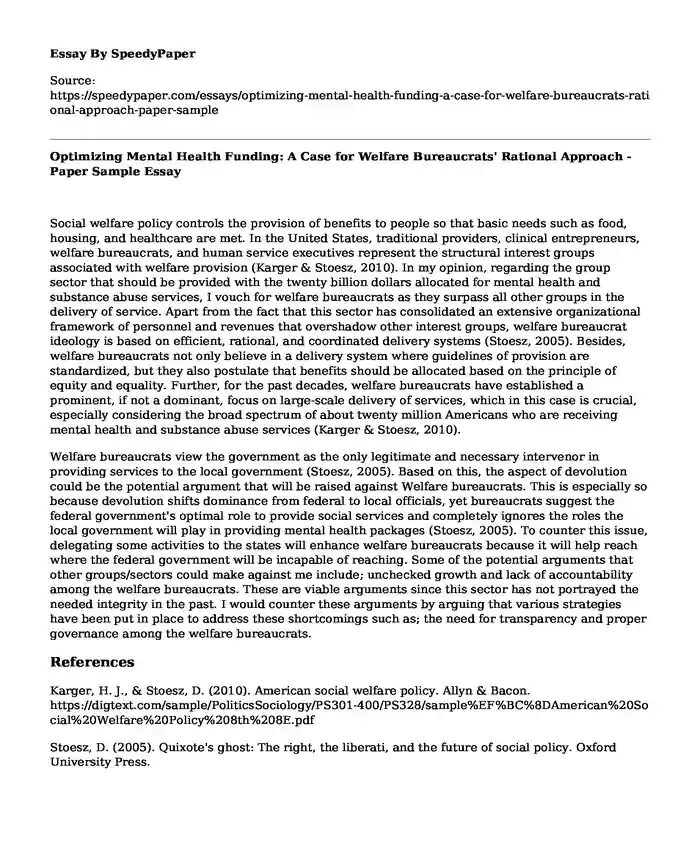
| Type of paper: | Essay |
| Categories: | Health and Social Care Government Mental health |
| Pages: | 2 |
| Wordcount: | 436 words |
Social welfare policy controls the provision of benefits to people so that basic needs such as food, housing, and healthcare are met. In the United States, traditional providers, clinical entrepreneurs, welfare bureaucrats, and human service executives represent the structural interest groups associated with welfare provision (Karger & Stoesz, 2010). In my opinion, regarding the group sector that should be provided with the twenty billion dollars allocated for mental health and substance abuse services, I vouch for welfare bureaucrats as they surpass all other groups in the delivery of service. Apart from the fact that this sector has consolidated an extensive organizational framework of personnel and revenues that overshadow other interest groups, welfare bureaucrat ideology is based on efficient, rational, and coordinated delivery systems (Stoesz, 2005). Besides, welfare bureaucrats not only believe in a delivery system where guidelines of provision are standardized, but they also postulate that benefits should be allocated based on the principle of equity and equality. Further, for the past decades, welfare bureaucrats have established a prominent, if not a dominant, focus on large-scale delivery of services, which in this case is crucial, especially considering the broad spectrum of about twenty million Americans who are receiving mental health and substance abuse services (Karger & Stoesz, 2010).
Welfare bureaucrats view the government as the only legitimate and necessary intervenor in providing services to the local government (Stoesz, 2005). Based on this, the aspect of devolution could be the potential argument that will be raised against Welfare bureaucrats. This is especially so because devolution shifts dominance from federal to local officials, yet bureaucrats suggest the federal government's optimal role to provide social services and completely ignores the roles the local government will play in providing mental health packages (Stoesz, 2005). To counter this issue, delegating some activities to the states will enhance welfare bureaucrats because it will help reach where the federal government will be incapable of reaching. Some of the potential arguments that other groups/sectors could make against me include; unchecked growth and lack of accountability among the welfare bureaucrats. These are viable arguments since this sector has not portrayed the needed integrity in the past. I would counter these arguments by arguing that various strategies have been put in place to address these shortcomings such as; the need for transparency and proper governance among the welfare bureaucrats.
References
Karger, H. J., & Stoesz, D. (2010). American social welfare policy. Allyn & Bacon. https://digtext.com/sample/PoliticsSociology/PS301-400/PS328/sample%EF%BC%8DAmerican%20Social%20Welfare%20Policy%208th%208E.pdf
Stoesz, D. (2005). Quixote's ghost: The right, the liberati, and the future of social policy. Oxford University Press.
Cite this page
Optimizing Mental Health Funding: A Case for Welfare Bureaucrats' Rational Approach - Paper Sample. (2023, Dec 17). Retrieved from https://speedypaper.net/essays/optimizing-mental-health-funding-a-case-for-welfare-bureaucrats-rational-approach-paper-sample
Request Removal
If you are the original author of this essay and no longer wish to have it published on the SpeedyPaper website, please click below to request its removal:
- Introduction to Public Health, Free Essay Sample
- Essay Example: The Link between HIV and Poverty in Sub-Saharan Africa
- Ethics and Professionalism Essay Sample
- Essay Example: Group Processes and Stage Formation
- Paper Example: Why I Want to Become a Warrant Officer in the US Marine Corps
- Essay Sample on Autism and Asperger's Syndrome
- Essay Sample Hybrid Simulation Framework for Healthcare Data Integration: A Multi-Methodology Approach
Popular categories




